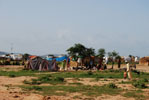
In Chad, a precarious political and humanitarian crisis just over the border from Darfur remains tenuous, threatening to derail any diplomatic progress that might be made inside Sudan. As our latest strategy paper – Chad’s Domestic Crisis: The Achilles Heel for Peacemaking in Darfur – discusses, challenges in Chad routinely take a backburner to the drama inside Sudan’s borders, even though they play a significant role in the long-term stability of the region. Chad, the country just west of Sudan, currently hosts 250,000 Darfuri refugees, some of whom fled over the border from Darfur more than six years ago.
Enough Advisor Omer Ismail explains the importance of addressing the links between political dynamics inside Chad and peace for Darfur and the broader region:
If we want a lasting regional peace there has to be a strategy to deal with Chad’s authoritarian governance and state weakness that have kept the country unstable. A durable regional peace is impossible without a radical change to a coercive Chadian political system that has long been dominated by the rule of the gun.
As the paper argues, the inadequacies of conflict resolution efforts in Chad continue to negatively impact peacekeeping efforts in the region. A comprehensive approach to peace must deal aggressively with the persistent internal turmoil in Chad, where the United States is in a unique position to coordinate international pressure on the government to enact genuine political reforms. On this point, Enough Policy Advisor Colin Thomas-Jensen notes:
Diplomacy in Darfur will continue to bear rotten fruit until the international community adopts a regional approach that includes credible efforts to address the internal crises in Sudan and Chad. This requires strategic vision and leadership, which the United States can provide.

